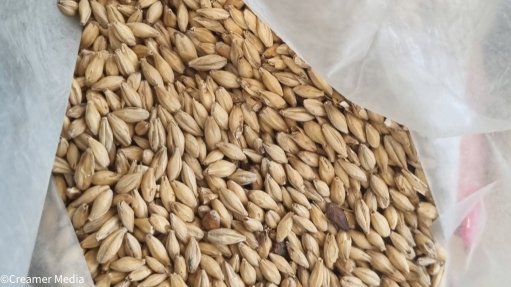
Carahell barley
Photo by: Creamer Media's Marleny Arnoldi
French multinational malt producer Soufflet Malt will invest €100-million in a new malting factory on the site of beer brewer Heineken’s Sedibeng brewery, in Gauteng, that will support more than 200 local barley growers, as well as create 55 full-time jobs.
This malt factory marks Soufflet’s second operation in Africa and will be operational by mid-2027.
Soufflet Malt developed Africa’s first barley-to-malt processing site in Ethiopia, which fully runs on green energy.
Notably, the Ethiopia plant enabled local sourcing of barley to grow from 5% to 95% for the customer.
The partnership between Soufflet and Heineken, which was officially signed during a ceremony on March 7, will effectively replace the 4 500 containers of barley that Heineken imports on a regular basis.
Heineken MD Jordi Borrut says the on-site malt availability will shorten the supply chain of what is the company’s main input into its Amstel, Windhoek and Heineken beers.
Notably, the next-door malt factory will have a conveyor installed for barley movement instead of the 25 delivery trucks that Heineken currently receives on a daily basis for deliveries of barley.
In turn, Soufflet has also committed to source barley locally from commercial and small-scale farmers, having started with a farmer development programme in 2014.
Soufflet South Africa MD Jeremy Antier confirms that the new malting factory, the construction of which will begin before mid-year, will have capacity to produce 100 000 t/y.
Soufflet Malt will sell malt to Heineken through a purchase agreement and retain ownership and operation of the malting facility. Should demand increase, Antier says the factory can be expanded to produce 125 000 t/y of malt.
A 10 ha area has been designated for the malting plant, as well as an additional 20 ha for solar farm development planned by both companies respectively.
Heineken’s malt intake includes Dark and Carahell varieties which it uses for different brands of beer.
Not only does this partnership strengthen localisation of barley of malt but also provides an alternative market for farmers that may otherwise struggle to access markets. In South Africa, barley growers are mainly based in the North West and the Southern Cape areas.
Soufflet will continue to work with emerging farmers in more regions such as the Northern Cape, Limpopo, Gauteng and Mpumalanga, particularly to help them access equipment for productivity, to strengthen the company’s supply base.
For the Sedibeng plant, Soufflet is procuring 95% of its barley from commercial farmers and 5% from small-scale growers.
Midvaal mayor Peter Teixeira lauds the companies for continuing to invest in the country and particularly in the Midvaal region, which he says has 350 ha of land available for more agriculture-type development.
He also committed his support to more investment in the region, including through quick processing of land use applications within four months. ![]()